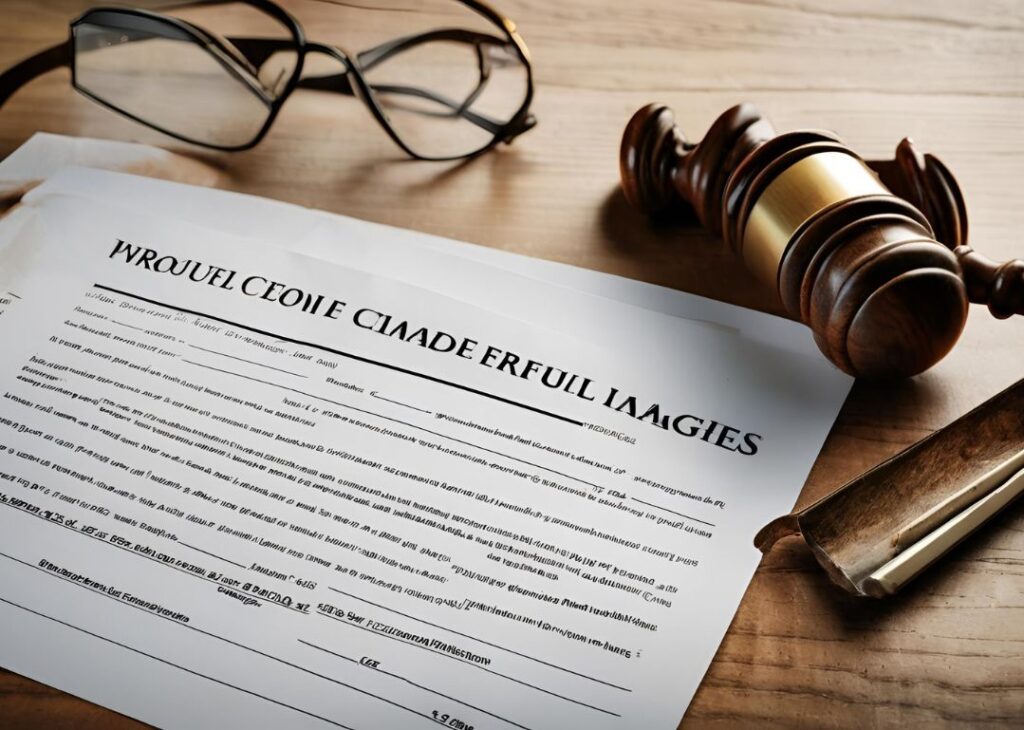TL;DR
To prove non-economic damages in a Georgia wrongful death claim, gather comprehensive evidence of the emotional and psychological impact, secure credible witness testimonies, present expert evaluations, and meticulously document the deceased’s relationships and the loss experienced. Demonstrating the depth of emotional suffering and loss of companionship is crucial for a successful claim.
Key Highlights
- Document Emotional Impact: Keep detailed records of emotional distress caused by the loss.
- Gather Witness Statements: Collect testimonies from family, friends, and colleagues about the deceased’s life and the impact of their loss.
- Expert Testimonies: Utilize psychologists or psychiatrists to validate the emotional suffering experienced.
- Proof of Loss of Companionship: Show how the deceased contributed to your life and the void their absence has created.
- Detailed Personal Records: Maintain journals, photos, and other personal items that illustrate the relationship and loss.
- Consistent Legal Representation: Work with an attorney experienced in wrongful death claims to effectively present your case.

Wrongful death cases in Georgia demand more than emotional closure, they require a clear accounting of financial loss. The Georgia Code (O.C.G.A. § 51-4-2) entitles eligible survivors to pursue compensation for the “full value of the life of the decedent,” which includes both tangible and intangible losses. On the economic side, this means identifying and quantifying every financial contribution the deceased would have made had their life not been cut short.
From lost future income and benefits to medical expenses and funeral costs, the calculation of economic damages involves both precise documentation and expert analysis. Georgia courts require evidence-based estimates that reflect not just current losses, but also projected financial impacts over a lifetime. This process is complex, especially when factoring in age, occupation, life expectancy, and inflation. Families seeking to recover these damages must understand how courts approach these valuations and why early legal and financial guidance is critical. If you’ve lost a loved one due to negligence, contact our firm for a free case evaluation. We’ll walk you through what compensation may be available and help ensure no economic loss goes unrecognized.
Understanding Non-Economic Damages
Non-economic damages refer to the intangible losses suffered by the bereaved family members. Unlike economic damages, which cover measurable losses like medical expenses and lost wages, non-economic damages address the emotional and psychological impacts of losing a loved one.
Types of Non-Economic Damages
- Pain and Suffering: The emotional distress caused by the death.
- Loss of Companionship: The absence of a loved one in daily life.
- Emotional Distress: Anxiety, depression, and other mental health challenges resulting from the loss.
- Loss of Consortium: The impact on personal relationships and support systems.
Importance in Wrongful Death Claims
Non-economic damages capture the full scope of the family’s loss, providing compensation for aspects that are not easily quantifiable but are equally significant. These damages play a crucial role in ensuring that the aggrieved parties receive comprehensive compensation for their suffering.
Gathering Comprehensive Evidence
Proving non-economic damages requires meticulous documentation and presentation of evidence that illustrates the emotional and psychological impact of the wrongful death.
Personal Documentation
- Journals and Diaries: Personal writings that detail daily struggles and emotional states.
- Photographs and Videos: Visual evidence that showcases the relationship and activities shared with the deceased.
- Correspondence: Letters, emails, or messages that highlight the bond and loss.
Witness Statements
- Family Members: Testimonies from immediate and extended family about the loss’s effect.
- Friends and Colleagues: Statements from those who can attest to the deceased’s role and the impact of their absence.
- Community Members: Insights from community members who interacted regularly with the deceased.
Lifestyle Evidence
- Social Media Posts: Online interactions that reflect the relationship and subsequent changes following the death.
- Daily Routines: Documentation of how life has changed without the deceased, emphasizing the void left behind.
Securing Credible Witness Testimonies
Witness testimonies are pivotal in substantiating non-economic damages. They provide firsthand accounts of the emotional and psychological toll the loss has taken on those left behind.
Selecting Witnesses
- Close Family Members: Immediate relatives who can speak to the personal loss and its effects.
- Friends: Individuals who can describe changes in behavior and emotional well-being.
- Professionals: Therapists, counselors, or clergy who have worked with the family members since the loss.
Preparing Witnesses
- Clear Testimonies: Ensure witnesses can clearly articulate their observations and feelings.
- Consistent Statements: Align testimonies to present a coherent narrative of the loss’s impact.
- Supporting Evidence: Encourage witnesses to reference specific incidents or changes they have noticed.
Presenting Testimonies in Court
- Formal Affidavits: Written statements that can be submitted as evidence.
- Live Testimonies: In-court appearances where witnesses can provide detailed accounts under oath.
- Expert Testimonies: Professional opinions that validate the emotional and psychological impact.
Utilizing Expert Evaluations
Expert evaluations lend credibility to claims of non-economic damages by providing professional assessments of emotional and psychological suffering.
Types of Experts
- Psychologists: Assess mental health impacts such as depression, anxiety, and PTSD.
- Psychiatrists: Offer medical evaluations of emotional and psychological conditions.
- Counselors: Provide insights into the therapeutic progress and ongoing emotional challenges.
Role of Experts in Claims
- Assessment Reports: Detailed evaluations that outline the extent of emotional suffering.
- Testimonies: Professional opinions presented in court to support the claims.
- Objective Evidence: Independent assessments that corroborate personal and witness testimonies.
Selecting the Right Expert
- Credentials: Ensure the expert has relevant qualifications and experience.
- Reputation: Choose professionals with a strong standing in the legal and medical communities.
- Relevance: Select experts who specialize in the areas most pertinent to the claim.
Demonstrating Loss of Companionship
Loss of companionship captures the emotional and practical void left by the deceased, emphasizing the profound personal impact on the family members.
Evidence of Relationship
- Shared Activities: Documentation of hobbies, interests, and routines shared with the deceased.
- Dependence: Examples of how family members relied on the deceased for emotional or practical support.
- Impact on Daily Life: Descriptions of how daily routines and responsibilities have been affected by the loss.
Emotional Impact
- Emotional Bonds: Testimonies that highlight the depth and significance of the relationship.
- Behavioral Changes: Observations of how family members have altered their behavior or lifestyle post-loss.
- Mental Health Effects: Documentation of increased stress, anxiety, or depression resulting from the absence.
Quantifying the Loss
- Life Activities: How the deceased was integral to family gatherings, celebrations, and day-to-day interactions.
- Support Systems: The role the deceased played in providing emotional and practical support within the family.
- Future Plans: Shared dreams and plans that are now unattainable due to the loss.
Presenting a Strong Case with Legal Representation
Effective legal representation is essential in compiling and presenting evidence of non-economic damages, ensuring that all aspects of the loss are adequately covered.
Choosing the Right Attorney
- Experience: Select an georgia wrongful death lawyer with a proven track record in wrongful death cases.
- Specialization: Ensure the attorney specializes in personal injury and wrongful death claims.
- Reputation: Look for positive client reviews and a strong standing in the legal community.
Collaborating with Your Attorney
- Comprehensive Documentation: Provide all necessary evidence and documentation to support your claim.
- Open Communication: Maintain clear and consistent communication with your attorney throughout the process.
- Strategic Planning: Work together to develop a robust strategy for presenting non-economic damages.
Maximizing Claim Potential
- Thorough Investigation: Ensure all aspects of the loss are explored and documented.
- Expert Coordination: Leverage expert testimonies and evaluations to strengthen your case.
- Effective Presentation: Present evidence and testimonies in a compelling and organized manner to maximize impact.
Overcoming Challenges in Proving Non-Economic Damages
Proving non-economic damages can be complex, as these losses are inherently subjective. Understanding potential challenges and strategies to address them can enhance the strength of your claim.
Subjectivity of Pain and Suffering
- Clear Evidence: Utilize detailed personal documentation and witness testimonies to illustrate emotional distress.
- Consistent Narratives: Ensure that all evidence and testimonies consistently reflect the depth of the suffering experienced.
Quantifying Emotional Loss
- Expert Valuations: Use expert evaluations to provide an objective assessment of emotional and psychological impacts.
- Comparative Analysis: Compare your situation with similar cases to provide context for the claimed damages.
Legal Hurdles
- Proving Causation: Demonstrate a clear link between the wrongful death and the emotional suffering experienced.
- Adhering to Deadlines: Ensure all legal filings and evidence submissions meet Georgia’s statute of limitations and procedural requirements.
Mitigating Emotional Strain
- Support Systems: Engage with support groups or counseling to manage the emotional strain of the legal process.
- Professional Guidance: Rely on your attorney and support network to navigate the complexities of the case.
Conclusion
Securing non-economic damages in a Georgia wrongful death claim requires a detailed and compassionate approach. By meticulously documenting the emotional and psychological impacts, gathering credible testimonies, and leveraging expert evaluations, families can effectively demonstrate the profound losses they have endured. Working with a skilled attorney ensures that each aspect of the suffering is presented comprehensively, increasing the likelihood of a successful claim.
If you are facing the heartache of wrongful death, taking prompt action is essential. Contact us today for a free case evaluation to understand your rights and explore the avenues available for obtaining the compensation you deserve. Your journey towards healing and justice begins with the right support and informed steps.
